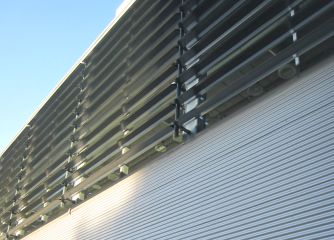An innovative holistic approach considers the indoor climate performance, the energy performance, and the environmental impact of the building in the initial design phase to ensure that effective sustainable buildings are achieved.
 Energy saving building
Energy saving building
The net-zero energy buildings (NZEB) concept is a new idea that has been brought on by the new Energy Performance of Buildings Directive (EPBD). Present building codes have standard energy efficiency requirements. The NZEB concept means that buildings that have a zero energy balance perform better in terms of energy performance than those with standard requirements. The EPBD directive introduces more stringent standards for new buildings and is mandatory for public buildings by 2018 and for general buildings by 2020.
DIRECTION, a project funded by FP7, intends to show that the new standards could be adopted by new buildings using inexpensive and effective energy efficiency solutions. Normally, architectural design, building energy management systems and equipment are considered separately. The innovative approach considers these factors together and how they affect each other in a holistic manner.
A major part of energy consumption (40%) and 36% of CO2 emissions are related to buildings. The EU's climate & energy 2020 objectives aims to achieve energy savings of 20%, reduction of 20% in greenhouse gases emissions, and achieve renewable energy share of 20%.
Three sites - the new technology park in Bolzano, Italy, the Nu-Office in Munich, Germany, and the CARTIF Boecillo site, in Valladolid, Spain have been selected as showcase sites. Primary energy consumption that is lower than 60 kWh/m2/year is intended to be achieved. Sophisticated building energy management systems, high-efficient equipment and energy optimization will be deployed. Further, architectural design solutions are to be implemented to improve the building envelope.
This ambitious project aims to serve as a reference for building professionals and others for implementing the EPBD guidelines.
Source: http://www.youris.com/